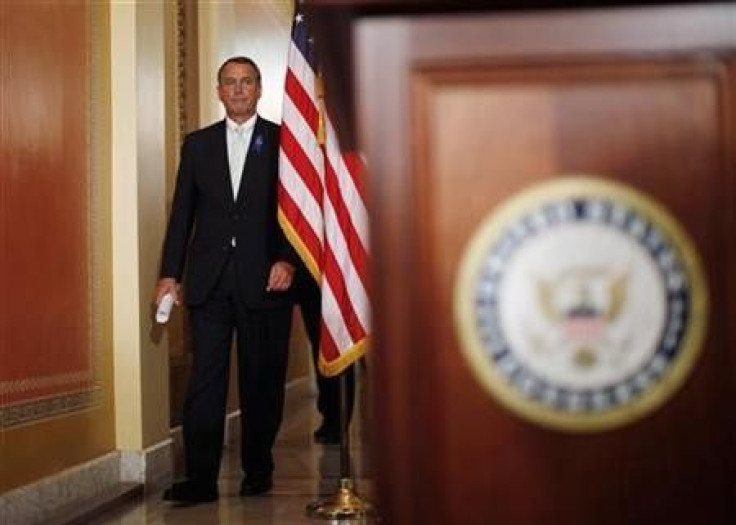Analysis: The politics behind Boehner's two-step debt hike

So many Americans are so sick of political acrimony over raising the U.S. debt limit that it might seem unfathomable to have to do it all over again early next year. But that is exactly what the top U.S. Republican, John Boehner, is proposing for some practical political reasons.
If Boehner, the Speaker of the House of Representatives, prevails, President Barack Obama will sign legislation by August 2 to raise U.S. borrowing authority by about $1 trillion, or just enough to carry the government through March.
That would set up a second tortured debt limit debate to avert default just as the U.S. presidential campaign heats up.
Obama and his fellow Democrats, citing the need to ensure financial stability, demand the Treasury Department's credit limit be extended for longer, through the 2012 presidential and congressional elections.
Democrats and Republicans are rattling financial markets with their stand-off over raising the debt limit by the August deadline. Both sides have offered competing plans for making sure the United States can pay its bills.
"I'm not sure there's any grander strategy than to do what's possible," said John Feehery, a former adviser to House Republican leaders. "The two-step process makes sense if you think the House of Representatives can handle only so much in a hurry."
Boehner, who took the U.S. government to the brink of shutdown in April during a nasty fight over short-term spending, struck an agreement with Obama at the last minute, saying he held out for the best deal he could get for his Tea Party-driven conservatives.
The incoming Tea Party-aligned lawmakers had campaigned against the overall size of the U.S. government, the size of its deficits and the mountain of national debt, which has ballooned to $14.3 trillion.
And so the smaller the debt limit hike the better for Boehner and his ability to get along with the Tea Party, even if public opinion polls show growing impatience with Republican tactics.
"To the Republicans, it's more important to please the Tea Party base than it is to take the chance that the general public might be turned off to their methods," said Larry Sabato, director of the University of Virginia's Center for Politics.
"The theory is that the Tea Party is the group paying attention to the debt vote whereas the general public (including independent voters) will vote on the state of the overall economy" next year, Sabato said.
FIRMING SUPPORT
Boehner still has a way to go to solidify Tea Party support. For example, Senator Rand Paul, a leading Tea Party activist, has dismissed the House leader's deficit-reduction/debt limit plan as "not serious."
But if Boehner can firm up support with others in the Tea Party by advocating a two-step approach, the Republican Party can then move on to trying to appeal to the electorate more broadly.
By staging a second debt limit vote next year, said Ron Bonjean, another former aide to Republican leaders in Congress, "It keeps the spending and tax issues alive and makes Democrats go on record during an election year in favor of increasing taxes at a time of high unemployment."
"It's a perfect setup," Bonjean said, for Republican presidential candidates to attack Obama during their primary nominating season. He noted that a second debt limit debate could be getting under way in Washington just as the nation focuses more closely on Republican presidential candidates in the run-up to the New Hampshire primary and other key contests.
Paul Sracic, head of the political science department at Youngstown State University in the swing state of Ohio, said, "What Republicans really want is to get entitlement reform. They know they can't get that in one step," he said of moves to cut benefits in federally-funded healthcare and retirement programs.
So, a two-step procedure could provide a second shot at luring Democrats into some benefit cuts after failing to do so this time around.
© Copyright Thomson Reuters 2024. All rights reserved.











